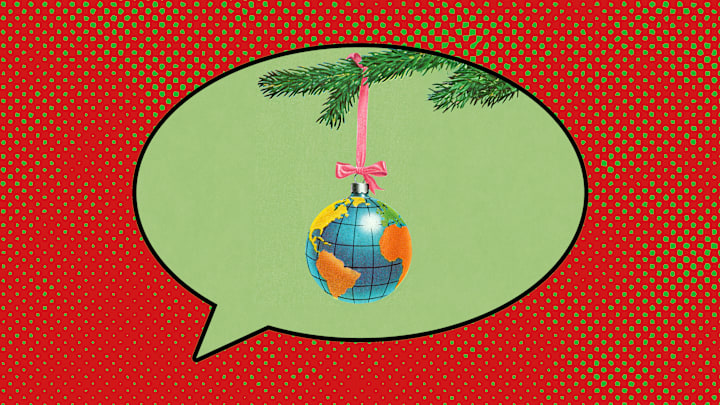Now that Christmas ads, holiday gift guides, and festive tunes like “All I Want for Christmas Is You” are back, there’s no better time to learn different ways to say “Merry Christmas” around the world—and learn some unique traditions that go hand-in-hand with the holiday.
1. Gleðileg jól // Iceland

Most countries have some version of Father Christmas, but in Iceland, they have 13 Jólasveinarnir (“Yule Lads”) instead. One of them arrives each night from December 12 to Christmas Eve to cause trouble and leave gifts (or a potato if you’ve been bad). They live in the mountains with their troll parents and have a big black cat called Jólakötturinn (“Yule Cat” or “Christmas Cat”). This house-sized feline loves eating people, and it doesn’t care if they’ve been naughty or nice—it only cares whether or not they’ve received a piece of clothing for Christmas, which indicates that they haven’t been lazy. If they’ve been industrious and done their work and chores, the Yule Cat will look for a meal elsewhere.
2. Merīkurisumasu (メリークリスマス) // Japan

There is no native Japanese phrase for Merry Christmas since the celebration was adopted from the West during the Meiji era in the 19th century. As a result, some of their traditions are also a little un-traditional. A lot of Japanese families actually eat KFC for Christmas dinner. The practice dates back to the successful Kurisumasu ni wa kentakkii! (“Kentucky for Christmas!”) marketing campaign that the fast food company ran in Japan in the mid-1970s.
3. Joyeux Noël // Francophone countries

Although stockings are fairly synonymous with Christmas in many parts of the world, French children traditionally leave their shoes by the fireplace for Père Noël to fill up with presents instead.
4. Sing Daan Faai Lok (聖誕快樂) // Hong Kong

In Hong Kong, people don’t normally prepare a Christmas dinner at home; instead, they eat at restaurants, which serve special Christmas menus. Fun fact: In Cantonese, Santa is called “聖誕老人” (sing daan lou yan), meaning “Christmas Old Man.”
5. Frohe Weihnachten // Germanophone countries

In Germany, Austria, and other European countries, December 5 is Krampus Night, named after a hairy anthropomorphic figure with cloven hooves and goat horns. Traditionally, Krampus visits kids the night before the Feast of St. Nicholas, punishing those who behaved badly with sticks—and sometimes even carrying them away in a sack!
6. Meri Keuriseumaseu (메리 크리스마스) // South Korea

Although Christmas Day is a national holiday in South Korea, it doesn’t have the same level of importance as Seollal (New Year) or Chuseok (Mid-Autumn Festival), so people typically won’t travel back home; instead, they spend the celebration with friends and partners rather than family.
7. Feliz Natal // Lusophone Countries

Feliz Natal is how you say “Merry Christmas” in countries where Portuguese is spoken. In Brazil, Christmas celebrations are usually enormous, involving most of your extended family and friends. Gift giving can get expensive, so it’s common to do Amigo Secreto (“Secret Santa”), and a game is made out of trying to figure out who the present is going to or coming from.
8. Z Reezdvom (З Різдвом) // Ukraine

In Ukraine, Christmas trees are often decorated with artificial spider webs in reference to the story of the Christmas Spider. Legend has it that there was once a poor widow who lived in a small hut with her children. A pine cone fell onto their floor and grew into a Christmas tree, but they couldn’t afford to decorate it. On Christmas morning, however, they awoke to it covered in cobwebs which turned into silver and gold when the sun rose. Decorating your tree with spider’s webs is therefore a way to usher in good luck for the next year.
9. Feliz Navidad // Hispanophone countries

In Caracas, the capital of Venezuela, Christmas celebrations involve las patinatas (“the skating”), in which people roller-skate to Christmas mass. Roads are often closed so that this can take place. It’s said that children go to bed with a piece of string tied around a toe—the end dangles out of the window and people tug on it as they skate past to indicate that it’s time to wake up and go to mass!
10. Hyvää Joulua // Finland

In Finland, it is tradition to visit the sauna on Christmas Eve and there’s even a saunatonttu (“sauna elf”) who protects the sauna and its owners. People often leave snacks and beer for the elf, as well as some water after they’re done, so that the elf can have its own Christmas Eve sauna experience.
